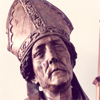Prince-bishops (as well as, technically, Prince-Archbishops, Prince-Abbots, Prince-Abbesses, Prince-Provosts and others), were prelates of the church as well as political rulers. In many societies it is common to combine religious and political power. Prince-bishops are merely one variant of the Christian Church's attempt. Indeed, the papacy, the institution of the Bishop or Rome who became the pope of the Roman Catholic Church, is actually one last remnant of the idea of spiritual princes: the pope claims to rule the Vatican City as a country.
While bishops who held political power arose to varying degrees in many European countries (in particular see Durham in England and Andorra) they were most particular to Germany. With the fall of the Roman Empire in the west, out of necessity bishops gained much of the authority formerly exercised by the Roman government. Medieval kings and emperors continued to favor bishops with political rights and privileges for centuries. As an institution of government in the Holy Roman Empire, prince-bishops competed with and were compared to other dukes, counts, and princes until the dissolution of all ecclesiastical political territories in 1806.
For sources about prince-bishops and the Holy Roman Empire, see our new encyclopedia about the Holy Roman Empire!
Last Updated: 2021 May 5
<http://brianpavlac.org/princebishops/>

